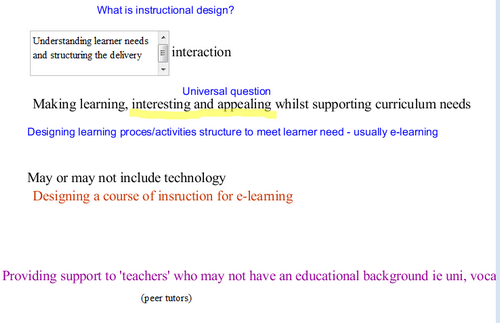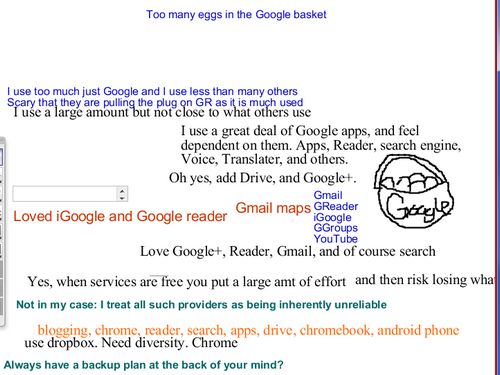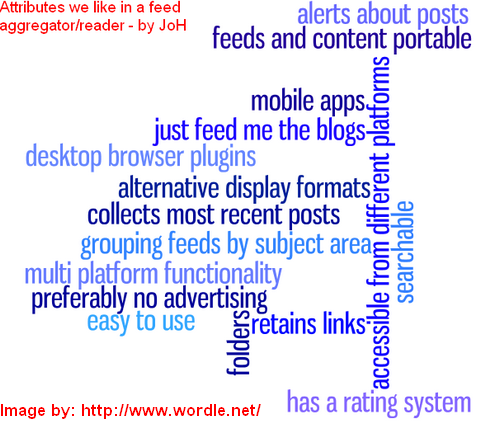Introduction
This overview is for three webinars – two Serendipity sessions and a FineFocus about “what isn’t taught in school”.
Serendipity topic – Instructional design
In this recorded session we talked about instructional design. There has been a recent discussion around instructional design in LinkedIn and it is a topic that arouses strong feelings. It was certainly at the top of my mind for two reasons:
- I was about to start a temporary new role working on a project to develop e-learning for a Certificate II (Australian levels) vocational course. This involves being part of a team with specific designated roles eg designer, developer, SME, although mine is a bit “woolly”! A sharp contrast to my usual situation where I am often the sole e-learning designer/developer or the facilitator and main designer/developer for a very small team.
- The second reason is my current involvement with others from my network in the development of deMOOC which is highly collaborative and informal without the narrow role designations of a formal team.

The discussion was wide ranging beginning with a look at “What is instructional design?” We also talked about the pros and cons of need for subject expertise in instructional design and other aspects of the process.
“What most schools don’t teach” – a FineFocus session
This was a session where I was unable to be present – I logged in but was unable to stay due to work commitments. So this is one of those recorded sessions where I needed to access the recording to find our what happened! This was a very small group so was more in the way of a two way conversation than usual.
One of the things that most schools don’t teach is coding! Those of you familiar with our webinars will know that my co-facilitator Phil is a programmer as well as a teacher. In this session Phil shared some ideas about the uses of teaching students to code. These are not just their resulting ability to write programs! However
I personally have some reservations about everyone learning to code – analysing systems and developing algorithms is one thing but writing good clean efficient code is very different. I think there are risks involved in that as is currently the case with building websites everyone who has learned by “playing” with the tools thinks they can do this to professional standards. The result with websites is many very poor quality websites built for organisations by amateurs.
Serendipity topic – the loss of GoogleReader
As always in Serendipity we began this recorded session with a whiteboard for topic ideas. The news that Google is to close GoogleReader was at the forefront and was the chosen topic.
This is the second Google product that I use personally where closure has been announced relatively recently, the previous one was iGoogle (due to close in Novemeber). In the light of this our first whiteboard was an opportunity to think about whether we, as individuals, have too many eggs in our Google baskets.

The consensus was that on the whole we probably do tend to use too many tools/apps from the one source. We considered briefly the “why?” and it usually comes down to convenience. You only need one login for your GoogleAccount and also the tools/apps often enable cross linking and cross posting to occur fairly seamlessly.
Links for a number of possible alternatives for GoogleReader were shared and we also added alternatives to some of the other Google tools/apps. Main takeaways from the session were that there are alternatives – we just need to look even though changing is a pain!
Conclusion
Three very interesting sessions with lots to think about. The Serendipity has given rise to the next FineFocus topic which will be an opportunity to share and explore some possible GoogleReader alternatives
Our Next Session
 Our next Webinar is a FineFocus session. Join us for “Replacing GoogleReader” in which we share and explore some possible replacements for GoogleReader. Join us on Thursday March 21st at 23:00 GMT/UTC the time for you will vary depending on your timezone (check yours here) Thursday afternoon/evening in the USA, late night Thursday in Europe, and Friday morning March 22nd in Australia – in the usual Blackboard Collaborate virtual room.
Our next Webinar is a FineFocus session. Join us for “Replacing GoogleReader” in which we share and explore some possible replacements for GoogleReader. Join us on Thursday March 21st at 23:00 GMT/UTC the time for you will vary depending on your timezone (check yours here) Thursday afternoon/evening in the USA, late night Thursday in Europe, and Friday morning March 22nd in Australia – in the usual Blackboard Collaborate virtual room.
 Our next webinar will be an Edublogs “Serendipity” session on Thursday March 28th at 23:00 GMT/UTC (Afternoon/Evening USA) or Friday March 29th at 7am West Aus, mid morning Eastern States Aus depending on your timezone (check yours here) – in the usual BlackboardCollaborate room. This is one of our fortnightly unconference sessions where we invite you to bring along your “hot topics” and “burning issues” for our poll on the topic
Our next webinar will be an Edublogs “Serendipity” session on Thursday March 28th at 23:00 GMT/UTC (Afternoon/Evening USA) or Friday March 29th at 7am West Aus, mid morning Eastern States Aus depending on your timezone (check yours here) – in the usual BlackboardCollaborate room. This is one of our fortnightly unconference sessions where we invite you to bring along your “hot topics” and “burning issues” for our poll on the topic



